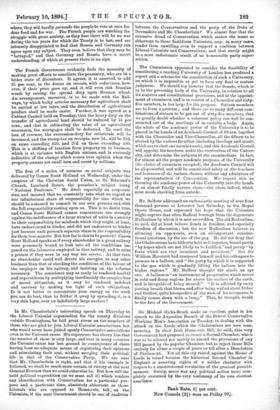The Commission appointed to consider the feasibility of constituting a
teaching University of London has produced a report and a scheme for the constitution of such a University, on which it is impossible as yet to form any final or mature judgment. We should say however that the Senate, which is to be the governing body of the University, in relation to all its statutes and constitutional provisions, and to the appoint- ment of examiners, and is to consist of a Chancellor and sixty- five members, is too large for the purpose. Sixteen members are to form a quorum ; and there are so many different com- binations of sixteen to be got out of sixty-five members, that we greatly doubt whether a coherent policy can well be con- structed out of the meetings of so variable a body. Again, the whole of the academic power of the University is to be placed in the hands of an Academic Council of fifteen, together with the Chancellor and Vice-Chancellor, all the fifteen to be elected by the various faculties (including theology and music, which are to elect one member each), and this Academic Council will appoint the teachers, settle the curriculum of the Univer- sity, and determine the subjects of the examinations. In fact, for almost all the proper academic purposes of the University (the choice of examiners excepted), the Academic Council will be all-powerful, and will be constituted solely of the teachers and lecturers of the various classes, without any admixture of the representatives of Convocation. We regard this as throwing the academic power of the University into the hands of an almost fatally narrow class,—the class, indeed, which most needs checking from outside.






































 Previous page
Previous page